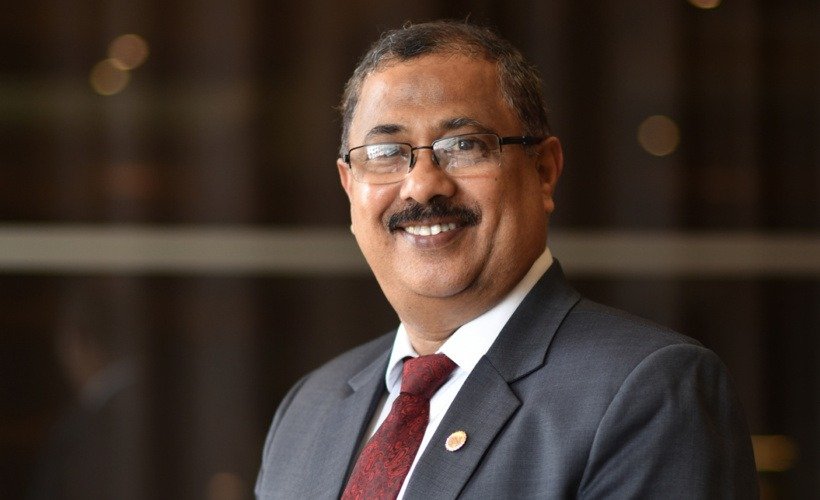
Rajkumar Kamat, Founder and Managing Director, EP Biocomposites Ltd, speaks on the company’s listing on the BSE
Journey of EP Kamat Group from an MSME to getting listed on the BSE SME Exchange
At EP Kamat Group we have been committed towards nurturing a better environment since its inception in 1991 with EP Industry which was initially into powder coating. Later on, we moved on to manufacturing ornamental railing gates, etc. and exported gates and railings from 2002 to 2007 until the US market crash of 2008. We got into the manufacture of FRP doors since 2002. Around 2009-10, I got involved in social activities which helped me to lead GSIA, BNI and other organisations.
In 2016, we revisited our business and services and felt that we should move away from powder coating, gates and railings and get into sanitation. As the Prime Minister of India had commenced the ‘Swachh Bharat Abhiyan’, we thought of entering this sector. We tried to identify the technology that would be available to us. After doing a detailed study, we found out that the Defence Research and Development Organisation (DRDO) was offering the most appropriate technology developed by them. We went in for the bio-digester technology from DRDO in 2017 and by 2018 we set up a bacteria generating plant. Here, there are two technologies involved, one is the bio digester tank made out of composites and second is the bacteria. We obtained the seed bacteria from DRDO and set up a plant which generated bacteria which helped run the bio digesters. Bio digesters are a direct replacement for septic tanks. The bio digester tanks are smaller in size, cost less, are environment friendly and have no maintenance vis-a-vis septic tanks which made it the perfect technology. This is where the bio toilets came into the picture. We were one of the five contractors who executed a tender floated by the government of Goa. While we were working on that and trying to identify what could be further applications of bio digesters; we realised that many organisations had STPs which were not working, which defeated the very purpose of a STP. We therefore decided to get into the sewage treatment and effluent treatment business and took on board a team which had around 25-30 years of experience. Here we decided to go in for a combination of technologies because we could offer each customer a customised solution based on his or her requirements. This has been our journey as far as our products and services go but I would not like to call it a journey from a MSME to the BSE, because we still are an MSME. It is a journey from a proprietorship to a public limited company.

What made you go for a listing and what was the vision behind it?
IPO listing is not the end in itself, but a means to an end-for me the objective is exponential growth and IPO and BSE SME listing is one of the steps towards it. In 2019, after Vibrant Goa I made up my mind that we should go in for the SME IPO. The decision streamed out of a few experiences. In 2018, for a BNI event, we had invited Ajay Thakur the head of the SME platform of the BSE. He spoke about unlocking the value of a business by going through an IPO. At the same time, when our tender was being floated the quantity expected was high and this had to be executed in a short time. I needed funds and began looking out. Banks could only offer limited funds depending on your past turnover. When in 2018 we had disinvested from the powder coating business, we realised that we had to sell off our business just at assets value. After being in the business for 25-30 years getting just the face value of our assets was quite disappointing and therefore I felt two aspects would get covered with the IPO. One would be unlocking the value of the business and secondly the constraints which we faced from the banks for funding, where they were unable to match up to our requirements for exponential growth, would be taken care of. Due to these two reasons I felt the IPO was perfect for us. We took a call in 2018 but since I had other commitments as the President of GSIA and Vibrant Goa Global Summit I decided to wait. After Vibrant Goa, which happened in October 2019, in January 2020 we formed EP Biocomposites Ltd which was a public limited company but without public shares. We had seven shareholders then. My vision behind this was to grow our business exponentially without any constraints of funds and add value to our business.
How long was the process right up from conceiving the idea to getting it done?
The thought came to me at the end of 2018. But we decided to execute it at the end of 2019. We began the process but then covid hit in March 2020. We deferred it until 2021 till the situation began to improve. In July-August 2021 things became stable and we decided to rework and move ahead. We appointed a merchant banker in August 2021 and after a very thorough due diligence they finished the process by January 2022 and BSE approval for Depository Participant (DP) in March 2022. The Merchant banker felt it would be better to go ahead with the issue after the finalisation of the March 2022 balance sheet which got finalised around June end. Between July to August we finished the rest of the process and on the 29th of August we opened the IPO.
Your issue was oversubscribed 17 and a half times. Do you think you should have gone for a bigger listing?
First and foremost, I am not aware of the process of shares and listings. This was a new experience for me. I know my business and I know how to grow it. When the merchant bankers did the valuation, they came to a value of `20 crores. Therefore they fixed the issue price of around 120+ which finally came to a figure of 126. Whenever I talked to my friends or well-wishers who are into investments, they mentioned that this may look like a high price. Again, the situation in the stock market had already gone on a back foot with the Ukraine war and foreign financial institutions withdrawing from the country. My merchant banker said that there is nothing like a right or wrong time and it is all a question of the company, how strong is its foundation and what are its prospects. Considering we are in an environmental related business, a green tech business; with high potential and financially stable we could go for it. Now, in hindsight, we can think of a lot of things. But we went ahead and here we are today. As of today (20th Sept 2022) the share price at `126/- for IPO is trading above `200/-,which I do believe is a good indication of the company’s strong fundamentals.
What is the way forward for EP Biocomposites now that you are publicly traded?
Whether we are publicly traded or not does not matter to me from a business point of view. From the business end we are looking at growth and these funds that we have raised through the IPO will help us to grow at a faster rate. Our plans are to grow the business and we began strengthening our team for over a year. We got in younger professionals and have a good mix of wisdom and experience of the people who have been there with us for decades. We recruited quite a number of young professionals so that we could have the best. This process has to go further as we look at growing exponentially. So far most of our business comes from Goa while some bit comes from North Karnataka. Now we are leaning heavily on North and South Karnataka like Mangalore followed by parts of Maharashtra especially the Konkan areas, Ratnagiri besides Kolhapur.
Geographical expansions mean we will have to invest in those places in terms of building the brand and having the right team. So the funding is going to be used for that. We are also going to utilise technology substantially as we move forward. The company is exploring the overseas niche markets and looking to invest there. After we decided to go public, in 2021, we began work on digital marketing, too. From 25 leads initially, we now get 400 leads per month. Now, we would like to strengthen this further. The funds would also help us to develop new products and also look at overseas opportunities. In short, the way forward for the company is working on multiple fronts to ensure exponential growth.
What is it that you had to undo as an entrepreneur to make the shift from a private ownership to a public company?
Frankly speaking, I didn’t have to do much. Primarily because I have always been a hands off person; when you are a hands off person, you expect the people you recruit to take care of things. And when you expect such things you already have systems in place. We have these systems in place, however what is going to happen is the compliances of a public limited company are much more intensive and this is something we have to be prepared for. The process has begun and in the next two or three months our preparations would be complete on that front, too.





